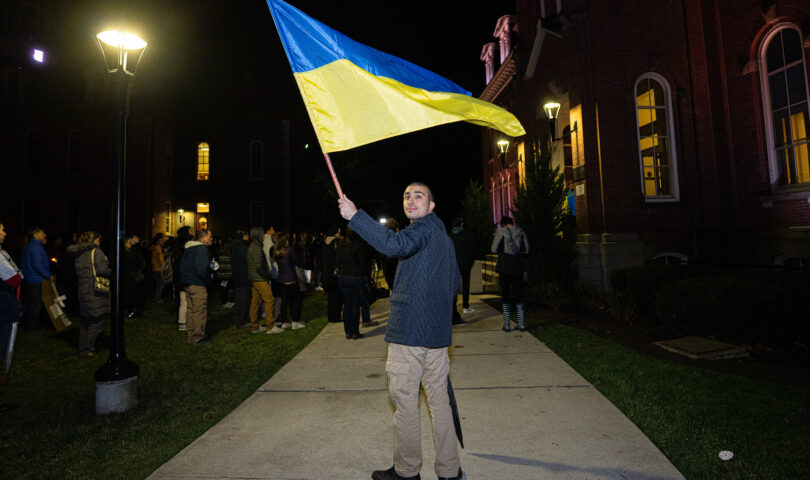Call them, the reverse-refugees.
That’s why Amber Brugnoli wasn’t joking.
She wasn’t exaggerating, either, even if she was speaking for effect.
“You can’t get to Russia or Ukraine right now,” the WVU global affairs officer said Thursday afternoon from her office at Purinton House on the downtown campus.
“Maybe if you went to Greenland and took a bobsled through Denmark and caught a ferry to Norway.”
Her rueful summation – with Rep. David McKinley, R-W.Va., looking on – caught the isolation the university’s nine Ukrainian students are feeling these days, along with their 10 Russian counterparts also enrolled here.
While the lawmaker and administrator were talking, the fighting continued on, as the Putin-led invasion of Ukraine readied to rumble into a sixth week.
Ukrainian guerilla fighters kept taking out tanks and Russian missiles kept hitting their marks.
Meanwhile, McKinley talked separately with students from opposite borders now sharing the same one in Morgantown.
Reporters were not invited to those sessions, and the lawmaker said later in Brugnoli’s office that he had just been there to listen, and offer what diplomatic assurances he could.
McKinley characterized President Biden’s sanctions leveled at his counterpart in Moscow as “insufficient,” he said.
He would have stepped up energy production in the U.S., he said, while giving Ukraine more of a techno-arsenal to ward off cyberattacks from a Russia facing surprising opposition.
Right now, he said, it’s his mission to look at student visas and other college particulars for that group of students who suddenly don’t have a home to go back to.
“We don’t want to turn these kids into collateral damage,” McKinley said.
Brugnoli agreed. She’s an assistant vice president in the university’s Office of Global Affairs, helping oversee that office’s Global Strategies and International Affairs division.
Pre-invasion, Brugnoli said, her office had already offered emergency resources to 25 international students with unforeseen circumstances at home.
Ukraine, she said, is definitely that.
The university, she said, is preparing to extend additional financial aid and housing for students – Ukrainian and Russian – impacted by the invasion.
“What that’s going to look like, we don’t know right now,” the global affairs officer said.
As said, those students whose visas are set to expire will also be tended to: WVU will open residence halls in the summer and is already reaching out to local hotels for additional lodging, if needed.
“The university will not let you not have a place to stay,” she said. “It would be morally irresponsible for us as an institution to say, ‘We can’t do anything for you.’”
McKinley, for now, wants to let the sanctions do the talking, as he continues listening to students suddenly made players on a global stage.
“We’ve got Putin’s attention,” he said. “Now, let’s fine-tune the sanctions.”
Khrystyna Pelchar appreciated McKinley’s attention Thursday.
She’s a doctoral student in political science from Lviv, in western Ukraine.
With shells now falling there, her mother, sister and grandmother, who refused to leave in the first place, are entrenched in the homefront effort more than ever.
“I’m glad the congressman listened to us,” she said. “I got emotional in talking with him. Because we’re fighting this war, alone.”
TWEET @DominionPostWV




